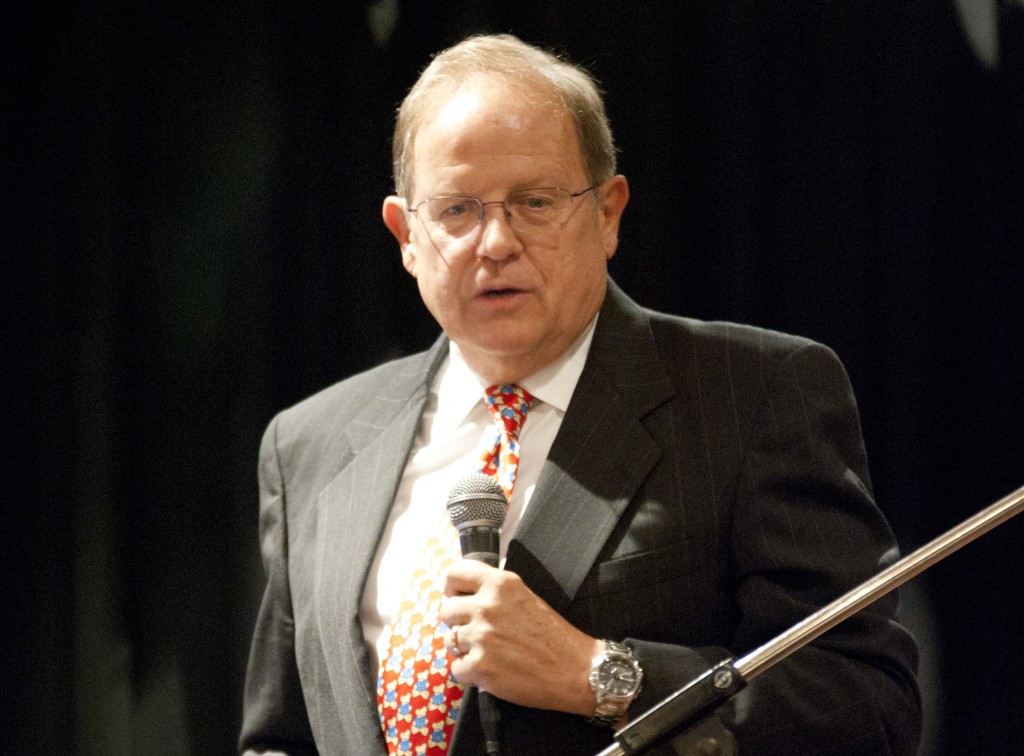
Hollywood didn’t abandon Christianity, Christianity abandoned Hollywood, visiting US family-friendly media advocate Dr Ted Baehr told audiences in Perth last week.
It was the churches, Catholic and Protestant, who walked away from positive engagement with film makers in the US, pulling funding from their ratings associations at the worst possible time in the 1960s.
Dr Baehr spoke at the Dawson Society for Philosophy and Culture’s third speaker’s forum at Rosie O’Grady’s pub in Northbridge on May 23 and at an Australian Family Association event the following day.
“Pagans will be pagans unless the church is salt and light in society,” Dr Baehr, a Protestant Christian, told around 70 people at the Dawson Society event.
“The Church has forgotten its role to go into the world and make a difference and there are many areas where the church has abandoned the mission field.”
In a statistic-laden hour-long presentation, Dr Baehr encouraged Catholics and other Christians in the audience to engage media makers to make more faith-friendly product and to teach children how to assess media critically.
Children were being allowed record levels of media consumption and media companies were effectively “writing the scripts of social behaviour” for them.
He cited research showing the more intelligent a child is, the more they are likely to be affected by media consumption, pointing to Colorado Movie theatre killer James Holmes, a PhD student who had grown up “in a strong Christian family and a strong church”.
“So if you are telling me that your kids are not influenced by the media what are you telling me about your children?,” Dr Baehr said in an impassioned call to action towards the end of his talk.
“You need to care about your children. You need to make a difference in the life of your children.”
Dr Baehr, whose mother was an actress and whose father was a film star with MGM before acting on Broadway, said he was loathe to criticise the industry he had grown up in.
God had drawn him “kicking and screaming” to faith in Jesus Christ, leading him to found Movie Guide in 1985 to advocate for Christian values in media and to review films for their inclusion or exclusion of virtue.
Research consistently suggested that ordinary people, religious and non-religious, preferred films with strong Christian virtues.
The reaction from film studios to Movie Guide’s advice and lobbying had been largely positive.
“Audiences love good movies … [and] we’ve been able to show people that they can make more money by reaching out to the more than 149 million people who go to church weekly in the United States”.
“People are looking for salvation. [Successful movies] have a positive world view,” he said, citing themes such as redemption and justice as common. “If Christians act like Christians, we can change the industry, and we’re doing it.”
During his Australian tour, a staffer at one of Australia largest media corporations told him his message “wouldn’t work” in Australia, saying “we’re very secular”.
Dr Baehr’s said his research suggested the opposite. Movie Guide “winners”, films that had been reviewed as containing many Christian virtues, ‘dominated’ Australia’s Top 20 film list.
“Australia’s pretty much like the rest of the world. They want good to triumph over evil and they want a saviour.”
Dr Baehr encouraged parents to educate their children to be ‘media wise’, saying there were four keys to ‘media wisdom’: understanding the influence of the entertainment industry; understanding a child’s stages of development; understanding the grammar of the media; and understanding one’s own moral and spiritual values, to be able to teach them to children.
“When a person takes that child into a movie with excessive sex and violence and thinks that that child’s not learning who’s at fault? The parent. The child is learning,” Dr Baehr said.
Movie Guide never gave a ‘thumbs down’ to a film because it did not want children to “become robots” in condemning films, instead it wanted to instil a discerning wisdom.
Dr Baehr used the 1999 sci-fi action film The Matrix as an example, saying there were “many good things” about the film – a saviour-type, a type of the Holy Spirit – but that its ontology (understanding of reality) was problematic.
“We believe that we live in a real world, with real pain, with real suffering, that needs a real Saviour,” Dr Baehr said.
“My wife has been on chemotherapy for 19 years. I can’t do abracadabra and her be healed.
“I grew up in a nominalistic world. My parents were pagans. They thought that mind over matter worked.
“Mind over matter does not work. That’s why we need Jesus. That’s the answer to our problems, not some wish fulfilment.”